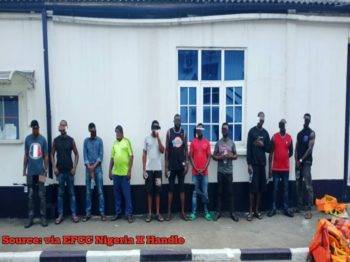The Lagos Zonal Command of the EFCC has begun probing 11 individuals suspected of involvement in oil theft, alongside one vessel named MT SAISNIL II. This investigation comes as a result of the Nigerian Navy’s interception and subsequent handover of the vessel and suspects to the EFCC. The Nigerian Navy’s actions were prompted by allegations of illegal oil bunkering and infractions related to the Automatic Identification System (AIS) at Abo Oilfield in Ogogoro Community, Ondo State.
The suspects, consisting of individuals such as Jimoh Olusola, Akinrodoye Tobias, and Idolor Ogun, among others, are currently under scrutiny by EFCC operatives. The commencement of this investigation underscores the collaborative efforts between law enforcement agencies to combat illegal activities within Nigeria’s maritime domain. As the investigation progresses, the EFCC remains committed to ensuring that those found culpable face the full weight of the law.
EFCC: Arrest Details and Allegations
The vessel MT SAISNIL II, along with its crew, was apprehended on February 7, 2024, by officers of the Nigerian Navy stationed at NNS Beecroft, Apapa, Lagos. The arrest stemmed from suspicions of the vessel’s involvement in illicit oil bunkering activities, as well as violations of the Automatic Identification System (AIS) regulations. These allegations point to a broader issue of maritime security and the illicit trade of oil within Nigeria’s territorial waters.
The intercepted vessel and its crew members, including individuals like Blessed Udoh Michael and Fineface Zorte, were operating in the vicinity of Abo Oilfield, located in the Ogogoro Community of Ondo State. The significance of this arrest lies in its potential to disrupt illicit activities that undermine the nation’s economic stability and environmental integrity. The Nigerian Navy’s proactive measures in apprehending suspected oil thieves demonstrate a commitment to safeguarding Nigeria’s maritime resources and upholding the rule of law.
Identity of Suspects Revealed
Among the 11 suspects currently under investigation by the EFCC, notable individuals include Victor Ime Edem, Shofela Bode, and Adejokun Taiye Emmanuel. These suspects, along with others like Golden A. Javan and Yekini Lukman, represent a diverse range of alleged involvement in illegal oil bunkering activities. The revelation of their identities serves to highlight the multifaceted nature of maritime crime and the necessity for targeted law enforcement efforts.
The EFCC’s scrutiny of these suspects underscores the agency’s commitment to unraveling complex criminal networks involved in illicit activities such as oil theft. By identifying and apprehending individuals implicated in such crimes, law enforcement authorities aim to disrupt the operations of illicit syndicates and deter future acts of maritime criminality. As the investigation progresses, the EFCC remains vigilant in its pursuit of justice and accountability.
Legal Ramifications Await
Upon the conclusion of investigations, the EFCC intends to pursue legal action against the suspects implicated in the alleged oil theft scheme. Individuals like Ajayi Oluwole, among others, may face charges related to their involvement in illegal oil bunkering activities and violations of maritime regulations. The impending legal proceedings underscore the severity of the allegations and the determination of law enforcement agencies to uphold justice.
The prospect of facing criminal charges serves as a deterrent to individuals and entities involved in maritime crimes, sending a clear message that illicit activities will not be tolerated. The EFCC’s commitment to prosecuting those found guilty highlights the agency’s mandate to combat economic sabotage and protect national interests. As the legal process unfolds, the accused individuals will be afforded their rights while being held accountable for their actions.
EFCC: Collaborative Law Enforcement Efforts
The handover of the vessel MT SAISNIL II and its crew to the EFCC by the Nigerian Navy underscores the importance of inter-agency collaboration in combating maritime crimes. The seamless coordination between the Nigerian Navy and the EFCC demonstrates a unified approach to addressing the complex challenges posed by illicit activities in Nigeria’s maritime domain. This collaborative effort enhances the effectiveness of law enforcement operations and maximizes the impact of enforcement actions.
By leveraging the respective strengths and capabilities of different agencies, such as the Nigerian Navy and the EFCC, authorities can effectively disrupt criminal networks engaged in illicit activities like oil theft. The successful interception and subsequent investigation of the suspected oil thieves exemplify the synergistic efforts of law enforcement agencies in safeguarding Nigeria’s maritime resources and promoting security and stability in the region.
EFCC: Continued Vigilance and Enforcement
As investigations into the alleged oil theft scheme progress, the EFCC remains steadfast in its commitment to combatting economic crimes and ensuring accountability within Nigeria’s maritime sector. The agency’s proactive approach to investigating and prosecuting individuals involved in illicit activities sends a strong signal that perpetrators will be held accountable for their actions. This serves as a deterrent to would-be offenders and reinforces the rule of law in maritime operations.
Moving forward, continued vigilance and enforcement efforts will be crucial in deterring and disrupting illegal activities in Nigeria’s territorial waters. By maintaining a robust regulatory framework and strengthening inter-agency cooperation, authorities can effectively address emerging threats and safeguard the nation’s maritime interests. The EFCC’s ongoing initiatives underscore the importance of sustained enforcement actions in combating economic crimes and promoting transparency and accountability within the maritime sector.
Table of Contents
Discover more from OGM News NG
Subscribe to get the latest posts sent to your email.














